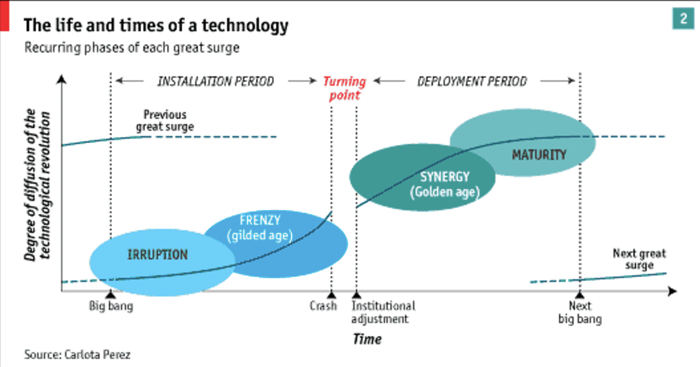Carlota Perez and the AI revolution
This is a talk I gave at Zoom HQ's AI night on August 13, 2024. You can check out the slides here, or sharing the talk below!
I learned a lot of market prediction frameworks as a VC, this one is my favorite.
It's also why over 30 years, I believe AI will transform every aspect of society.
It’s Carlota Perez’s framework of technological revolutions. It’s so cool. Let me show you – hope this framework changes your thinking as much as it's shaped mine:

So in 2002, we were here in the dot com crash:

This was peak crash, a lot of people at this point thought the web was overhyped.

But economist Carlota Perez comes out with a book that year saying: actually the web is not over, it’s just getting started. And over the next 25 years, the web is fundamentally going to change every part of the fabric of our society.
Of course, she was right. But at the time it wasn’t obvious. Now, how did she know?!
She had just spent 20 years studying the 5 major technological revolutions of human history.
What is a technological revolution? It’s when there’s a tech breakthrough that brings the cost of production way down.
- Industrial Revolution
- Steam engine (aka trains)
- Combustion (cars)
- Electricity
- Telecommunications
And she said, it’s so interesting and predictable, they all follow the same exact pattern!

Over 50-80 years there are 4 stages:

The first 2 stages is what we call the installation phase, it’s just getting started. And the second 2 stages is called the deployment stage - it’s where the technology, well, gets deployed.
Stage 1: there is the technological breakthrough.
Stage 2: As investors catch wind, they all want in. Lots of speculative capital. There’s a huge bubble.
Ultimately the bubble crashes. During the crash often is when there’s standardization and regulation that helps the technology actually be deployed later on.
The investment and attention that came in during the bubble funds R&D and infrastructure that then is used to deploy the technology and slowly over 25 years. Over that time, the technology is deployed everywhere. And through that deployment the technology fundamentally changes the nature of the world.
These are true revolutions, in that the change is total. These technologies totally transformed the world.
Think about the car. As it became deployed, it fundamentally changed where we live, how we spend our time, what we eat, and every aspect of society.
Here’s a more recent example of the cycle that we all lived through: The Web

First there was a few decade period where it was invented.
Then there was the dot com bubble and crash.
But the bubble brought in dollars for infrastructure like cables and R&D that allowed for the web to become deployed everywhere after the crash.
Over 20 years since the crash, we connected everything to the web.

And by doing so, the web fundamentally changed what we mean by everything. (E.g. first we connected stores to the web, then the web changed what we mean by stores)

The other part of her framework is that as one technological revolution reaches maturity, the next one begins.

So as the web has matured, the AI revolution has begun.
And it already seems to be following the same pattern:

Modern ML has been in development for a few decades, now we are in a frenzy and a bubble. The bubble will crash.
But then what next? We will connect everything to AI. And over time, AI will change everything about how we spend our time and interact with the world, how we live and how we work.

Not ready to stop imagining the AI future? Here are our predictions for AI engineering in the next 10 years.
